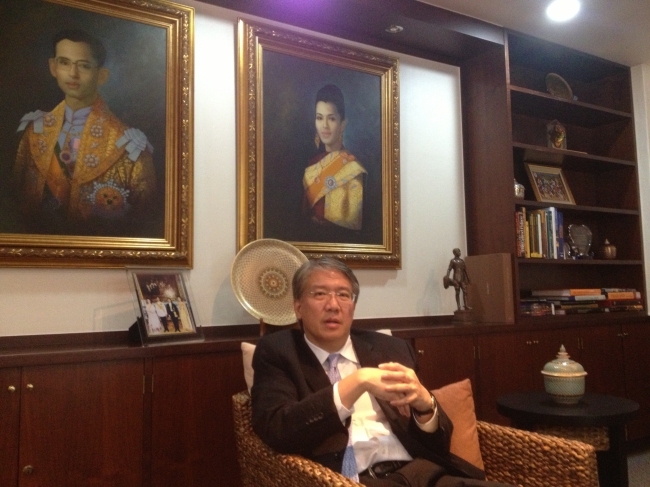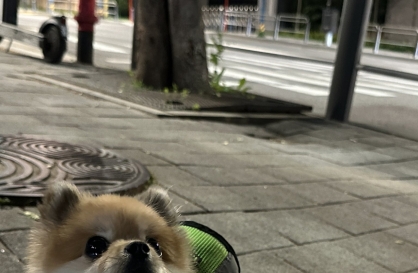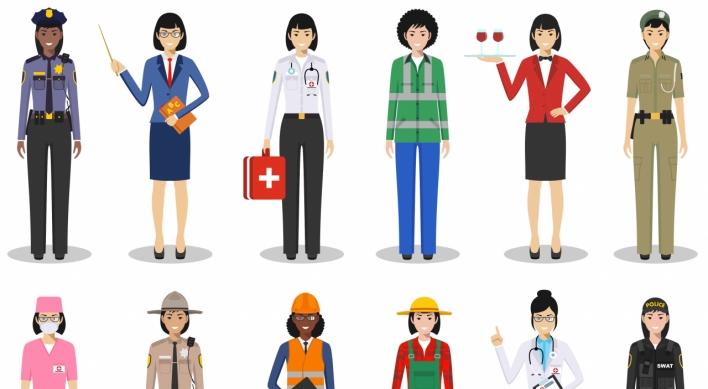Ever eat out at an authentic Thai restaurant here? That is doubtful, according to the Thai Embassy in South Korea.
There is a dearth of restaurants in South Korea serving real Thai cuisine made from real Thai ingredients at the moment, according to the Thai Ambassador to South Korea. But he is keen to change that.
Kittiphong na Ranong sees improving Thai food restaurants as a way of prying open markets here, which he sees as too closed to agricultural products from his country.
The embassy is determined to upgrade Thai restaurants and the popularity of Thai cuisine here with a number of promotional campaigns, such as one this week: “Thai Restaurant Week” from Sept. 23-29.
“When we launched a promotional campaign earlier this year at a restaurant at Lotte Hotel, we found it extremely difficult to even buy domestically-sold Thai rice,” he said in an interview with The Korea Herald on Sept. 16.
There is a dearth of restaurants in South Korea serving real Thai cuisine made from real Thai ingredients at the moment, according to the Thai Ambassador to South Korea. But he is keen to change that.
Kittiphong na Ranong sees improving Thai food restaurants as a way of prying open markets here, which he sees as too closed to agricultural products from his country.
The embassy is determined to upgrade Thai restaurants and the popularity of Thai cuisine here with a number of promotional campaigns, such as one this week: “Thai Restaurant Week” from Sept. 23-29.
“When we launched a promotional campaign earlier this year at a restaurant at Lotte Hotel, we found it extremely difficult to even buy domestically-sold Thai rice,” he said in an interview with The Korea Herald on Sept. 16.

Thailand exported 90 tons of kitchen table rice to South Korea in 2012, a fraction of a percentage point of the 30,000 tons of rice exported from here to Thailand. The vast majority of Thai rice exported to South Korea is low-grade brown rice destined for industrial uses, such as in the manufacture of store-bought makgeolli, Korean fermented rice wine.
Put simply, Thai restaurants cannot make the grade if chefs cannot get their hands on quality agricultural products from Thailand, according to Kittiphong.
Of the 172 restaurants that the embassy determined serve Thai cuisine, 71 were selected to participate in this week’s promotional campaign.
The problem, according to Kittiphong, rests with South Korean import quotas. The permitted amount of Thai rice, poultry, fruit and other agricultural shipments ― which made up about 20 percent of its total exports of 13.6 billion won ($12.5 million) in 2012 ― is limited. Kittiphong wants the quota lifted.
South Korea and Thailand agreed to seek preliminary discussions and a joint study on forging a comprehensive economic partnership agreement when former President Lee Myung-bak met with Thai Prime Minister Yingluck Shinawatra in Bangkok in November 2012.
The two nations also agreed to seek to increase bilateral trade to $30 billion by 2016. Such an enormous increase in trade ― a doubling over the next three years ― could only be met by lifting South Korea’s import quotas on Thai rice, poultry and such Thai fruits as longan and pomelo, the ambassador said.
Thailand currently has a huge rice surplus stockpiled by the government as a result of a recent price support scheme, meant to help out small farmers.
If sold at current market prices, however, the stored rice would result in profit losses and government deficits. Thailand is aggressively searching for untapped markets.
The Thai government’s new intervention began with the landslide electoral victory of Yingluck’s Pheu Thai Party in 2011. In the subsequent two years, it has allocated $18.7 billion to buy rice and shore up support for farmers. The government currently has 10 million tons of rice in storage. This month, the government extended the policy, which could lead to an additional 10 million tons after the 2013-14 harvest due to start in October.
A career diplomat, the mild-mannered Kittiphong expressed frustration at the pace of Thailand-South Korea talks on lifting restrictions on imports, saying that the preliminary FTA talks and a joint feasibility study should take place in tandem with lifting the Thai rice quota.
“When we raised the issue last year, they said that it was a bad time because it was the end of the previous government, that we had to wait for the new government to settle into place,” he said. “But when the new government came in, they said it is the restructuring the ministry, that trade is being separated from the Ministry of Foreign Affairs.
“The issue of rice, chicken and fruits has been on the table for years, so we should be able to resolve that issue separately,” he said.
Why certain imported food items are not available on grocery store shelves in South Korea is debatable. According to proponents of the current restrictions, it is a matter of weak demand for Thai agricultural products.
Critics of the restrictions point to stiff non-tariff barriers here, such as sanitary and phyto-sanitary measures that they say are unfairly leveraged by the government to limit imports.
Discussions on lifting the quota on Thai rice appear slow. So, the embassy is focused on stimulating demand for Thai kitchen table food items through promotion drives such as its current effort.
In “Thai Restaurant Week,” diners are entered into a lucky draw with every minimum purchase of 50,000 won or more on a single receipt. The embassy will announce the winners in mid-October. Four grand-prize winners will receive round-trip flight tickets to Thailand.
Six restaurants are participating in the Thai Select program: Golden Thai in Songpa, Sala Thai’s Jamsil branch, Sala Thai’s Bundang branch, Siam at Seoul Station, Thai Orchid in Itaewon, and Wang Thai, also in Itaewon.
By Philip Iglauer (ephilip2011@heraldcorp.com)
-
Articles by Korea Herald








![[AtoZ Korean Mind] Does your job define who you are? Should it?](http://res.heraldm.com/phpwas/restmb_idxmake.php?idx=644&simg=/content/image/2024/05/06/20240506050099_0.jpg&u=)










